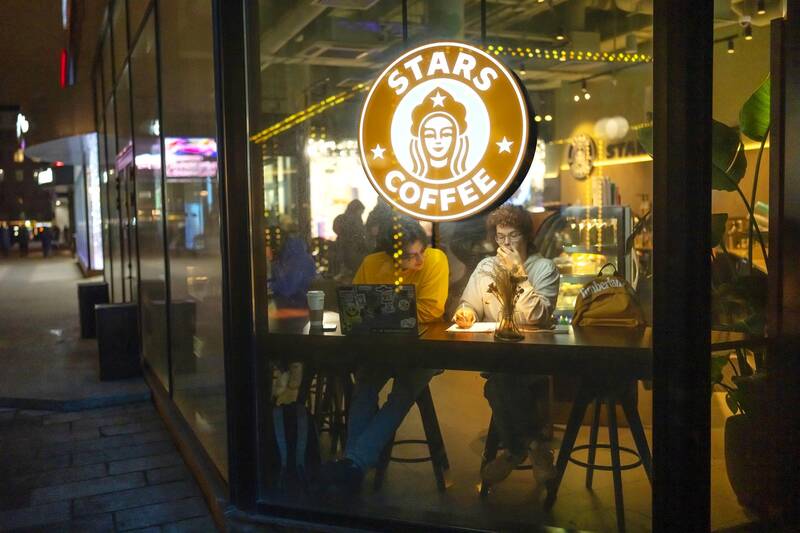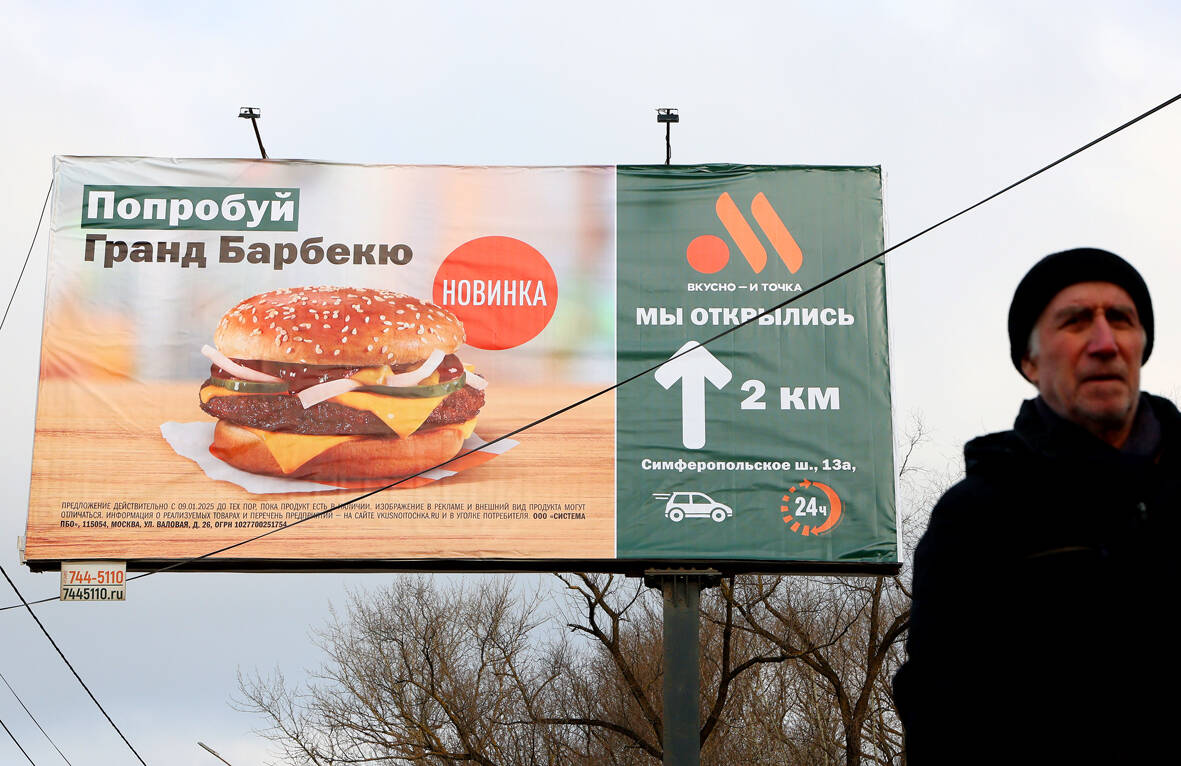The image of two beef patties on a sesame-seed bun with lettuce and cheese looks oddly familiar, and so does the stylized golden M on the carton of French fries. But this isn’t a McDonald’s, it’s an outlet of Vkusno i Tochka.
The Russian copycat filled the void after McDonald’s Corp sold its restaurants to a local franchisee. The move was part of an exodus of hundreds of global brands — from Adidas to Zara — after sanctions were imposed following the Kremlin’s invasion of Ukraine in February 2022.
Vkusno i Tochka, which means “Tasty, and that’s it” in Russian, got the restaurant network but not the brand rights, and it makes little effort to disguise its imitation.

Photo: AP
The logo vaguely evokes McDonald’s famous Golden Arches — even if it’s altered to depict a mini burger and two fries. Its version of the Big Mac is called the Big Hit, a Happy Meal is a Kidz Combo, and a Quarter Pounder is a Big Special.
Alongside the mimicry, subtle differences have crept onto the menu, with home-grown delicacies such as walnut-shaped cookies called Oreshki and slices of honey cake known as Medovik. Both treats are reminiscent of the Soviet era, when Moscow’s power reverberated around the world.
The combination of Western classics and local expertise is a sign of how Russian knock-offs have been digging in. Similar strategies at some other copycats are designed to preempt the original brands from trying to reclaim their standing among Russia’s 140 million consumers, which have remained relatively resilient.

Photo: EPA-EFE
THRIVING CLONES
With no end to the war in sight, the conditions for big consumer companies to return are still too risky. That gives more time for Russian rivals to prepare.
The success of Russian consumer companies came along with record income growth. The war-driven economy boosted production in military-linked sectors, creating labor shortages. Resulting wage increases outpaced inflation, freeing up money to spend on clothes and food. After initial uncertainty, consumer sentiment rebounded to above pre-war levels as daily life continued largely unchanged despite sanctions.
With 2 million customers a day and over 50 new restaurants a year, Vkusno i Tochka has thrived after local management bought McDonald’s Russian business for a token sum in June 2022. Revenue for parent company Sistema PBO has since more than doubled and profit has surged eightfold. It’s not about to give that up.
“We do not believe that after the lifting of sanctions, it will be the same as before,” Oleg Paroev, chief executive officer of Vkusno i Tochka, who was head of McDonald’s Russia when the war started, said last month during an economic forum in St. Petersburg.
Stars Coffee, which replaced Starbucks in the international backlash against Russia’s aggression, has followed a similar strategy of offering locals the feeling that they’re not missing out.
Much like Vkusno i Tochka, the company makes no secret about being a clone. On social media, it boasts that “Bucks left, the stars remain.” Its logo uses similar colors and styling as Starbucks’ but the figure wears a Kokoshnik — a traditional Russian headdress — instead of a crown.
Stars Coffee has opened 82 stores, deliberately moving beyond Moscow and St. Petersburg, with new locations in smaller cities including Grozny, Rostov-on-Don and Perm. Further expansion is targeted for Veliky Novgorod, Khanty-Mansiysk and Novosibirsk.
“Starbucks never actually opened in my hometown, but Stars Coffee did,” said Anna Vakhova, a travel influencer whose content often features life in sanctioned Russia. “Time plays a big role. The longer these brands stay on the market, the more recognition and trust they can build.”
Starbucks and McDonald’s declined to comment.
CLOTHING SECTOR
In the clothing sector, there has been a more nuanced picture. United Arab Emirates-based Daher Group bought the former Russian business of Inditex SA, including fashion chain Zara which was rebranded MAAG, but the operations have since posted two straight years of losses with deficits deepening last year. It’s been even worse for Uniqlo-replacement Just Clothes, which closed or changed names of all 13 stores earlier this year.
The struggles of retailers are related to the fact that originals are still accessible via online shops after the Kremlin in 2022 allowed so-called parallel imports of Western brands. That indicates that their lure remains powerful despite local alternatives.
Some domestic labels like LIME, though, have become winners. Founded in 2008, the apparel company has thrived since the war with pricing and style similar to the likes of Mango and Banana Republic. Since 2021, revenue has surged more than fivefold to US$495 million last year and its workforce roughly quadrupled, paving the way for its first store in Dubai at the end of 2023.
Similarly, Snezhnaya Koroleva — which means Snow Queen — is now Russia’s largest chain of multi-brand clothing stores, with more than a hundred outlets making a record profit last year. Small, independent Russian designers such as Mulier, 2mood and studio29 have also been boosted.
“Lots of Russian brands became successful due to the closure of Western brands, which we still miss,” said Mary Mateeva, a Russian fashion influencer and personal stylist in Moscow.
RETURN OF THE ORIGINALS?
As Russia’s attacks on Ukraine continue for a fourth year, the staying power of copycats is still a long way from being tested, and any reentry by foreign brands will also have to contend with official hurdles, which have yet to be specified.
International companies would only be granted a return if they don’t hinder “the further consolidation of the Russian manufacturer,” First Deputy Prime Minister Denis Manturov said in interview to Ria Novosti in June.
President Vladimir Putin has been even frostier. McDonald’s “ran away, and now, if they want to come back, are we supposed to roll out the red carpet for them? Of course not,” he said during the meeting with the business community in the Kremlin at the end of May.
Thawing relations could change the dynamic and create echoes of the end of the Cold War, when western goods were embraced. In the winter of 1990, tens of thousands of people lined up for hours to visit Russia’s first McDonald’s on Pushkin Square in Moscow.
But a revival of that kind of nostalgia doesn’t look to be part of the Kremlin’s plan.
“For Vladimir Putin, import substitution is an important part of his broader strategy — of defying the West and making it clear that Russia can survive on its own,” said Ben Noble, associate professor of Russian politics at University College London.

Google unveiled an artificial intelligence tool Wednesday that its scientists said would help unravel the mysteries of the human genome — and could one day lead to new treatments for diseases. The deep learning model AlphaGenome was hailed by outside researchers as a “breakthrough” that would let scientists study and even simulate the roots of difficult-to-treat genetic diseases. While the first complete map of the human genome in 2003 “gave us the book of life, reading it remained a challenge,” Pushmeet Kohli, vice president of research at Google DeepMind, told journalists. “We have the text,” he said, which is a sequence of

On a harsh winter afternoon last month, 2,000 protesters marched and chanted slogans such as “CCP out” and “Korea for Koreans” in Seoul’s popular Gangnam District. Participants — mostly students — wore caps printed with the Chinese characters for “exterminate communism” (滅共) and held banners reading “Heaven will destroy the Chinese Communist Party” (天滅中共). During the march, Park Jun-young, the leader of the protest organizer “Free University,” a conservative youth movement, who was on a hunger strike, collapsed after delivering a speech in sub-zero temperatures and was later hospitalized. Several protesters shaved their heads at the end of the demonstration. A

Every now and then, even hardcore hikers like to sleep in, leave the heavy gear at home and just enjoy a relaxed half-day stroll in the mountains: no cold, no steep uphills, no pressure to walk a certain distance in a day. In the winter, the mild climate and lower elevations of the forests in Taiwan’s far south offer a number of easy escapes like this. A prime example is the river above Mudan Reservoir (牡丹水庫): with shallow water, gentle current, abundant wildlife and a complete lack of tourists, this walk is accessible to nearly everyone but still feels quite remote.

In August of 1949 American journalist Darrell Berrigan toured occupied Formosa and on Aug. 13 published “Should We Grab Formosa?” in the Saturday Evening Post. Berrigan, cataloguing the numerous horrors of corruption and looting the occupying Republic of China (ROC) was inflicting on the locals, advocated outright annexation of Taiwan by the US. He contended the islanders would welcome that. Berrigan also observed that the islanders were planning another revolt, and wrote of their “island nationalism.” The US position on Taiwan was well known there, and islanders, he said, had told him of US official statements that Taiwan had not